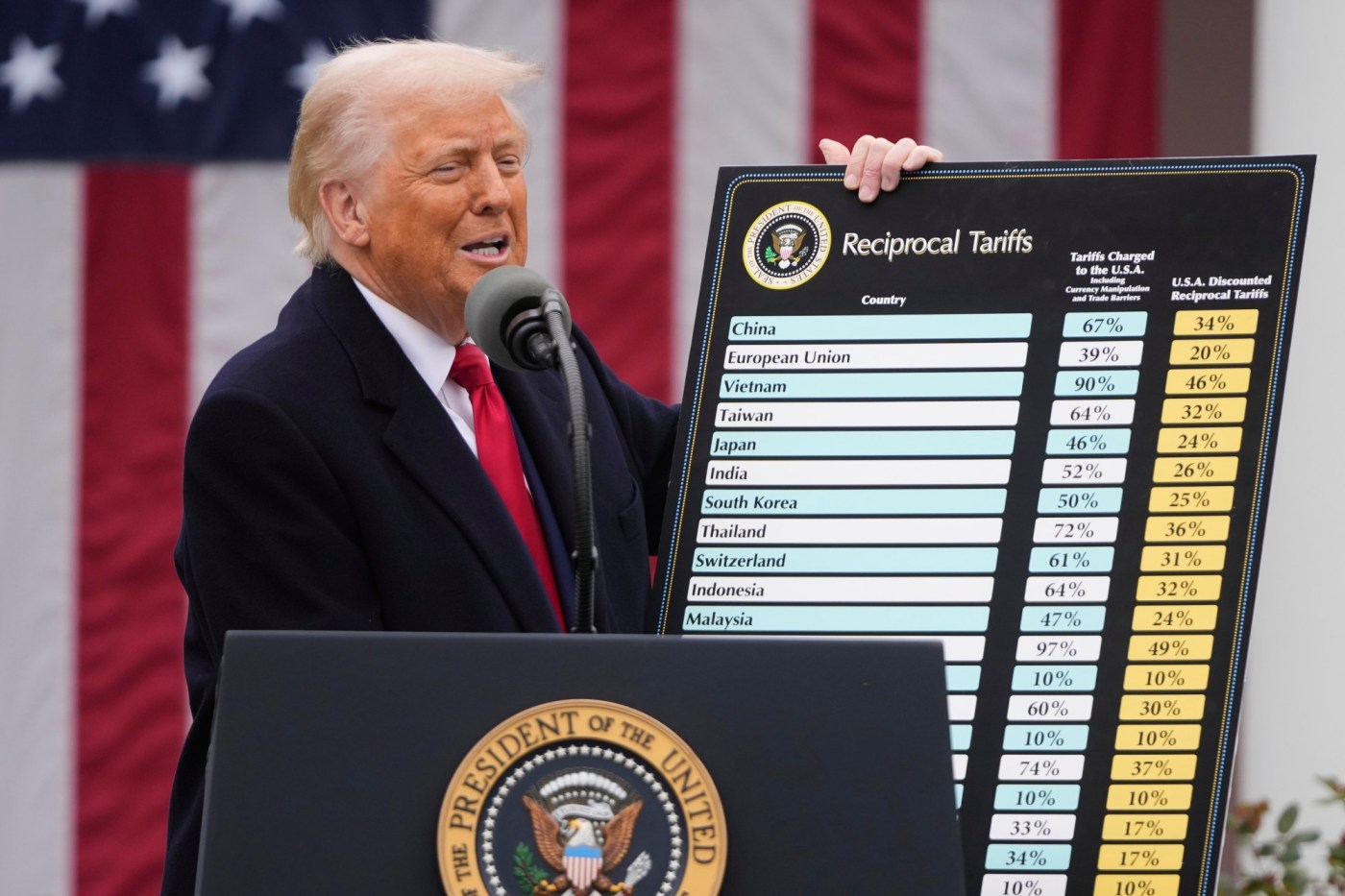
Trump declares ‘liberation day’ as he orders tariffs on all foreign goods
President Donald Trump declared that April 2 is Liberation Day in the United States and ordered a sweeping range of reciprocal tariffs on imported foreign goods from countries that charge tariffs on U.S. products and a 10% baseline tariff on goods from all other nations.
Trump, speaking from the Rose Garden at the White House, said Wednesday that his plan is a response to decades of abuse by competing foreign powers, and that the tariffs will result in gains for U.S. manufacturers and new jobs.
“My fellow Americans, this is Liberation day — waiting for a long time,” Trump said. “April 2nd, 2025, will forever be remembered as the day American industry was reborn, the day America’s destiny was reclaimed, and the day that we began to Make America Wealthy Again.”
According to the president, the U.S. has been “looted, pillaged, raped, and plundered by nations near and far, both friend and foe alike” for decades, impacting American farmers, steel workers, manufacturers, and skilled craftsman.
“They really suffered gravely, they watched in anguish as foreign leaders have stolen our jobs, foreign cheaters ransacked our factories, and foreign scavengers tore apart our once beautiful American dream. We had an American dream that you don’t hear so much about — you did four years ago and you are now, but you don’t too often — and for many years, and decades even, you didn’t hear too much about,” Trump said.
“Our country and its taxpayers have been ripped off for more than 50 years, but it’s not going to happen anymore,” Trump said.
Trump said that the tariffs charged to individual nations would be calculated based on the “combined rate of all their tariffs, non-monetary barriers, and other forms of cheating,” but that the U.S. would be “very kind” and only charge “half of what they are and have been charging us.” All other nations would face a “minimum baseline tariff” of 10%, the president said.
“The tariffs will be, not a full reciprocal — I could have done that, yes, but it would have been tough for a lot of countries and we didn’t want to do that,” he said.
Trump then held up a chart indicating the administration’s calculations and how much other nations would be charged. China, the chart showed, levies 67% tariffs on U.S. goods, and will see 34% tariffs in response, while the European Union’s 39% calculation will be met with 20% duties. The United Kingdom, a longstanding U.S. ally, will see a 10% tariff in response to 10% duties calculated by Trump’s staff.
“You see the numbers, the numbers are so disproportionate, they are so unfair,” Trump said.
The 10% baseline tariff will go into effect just after midnight on April 5, and the remaining individualized tariffs will go live at the same time on April 9, the White House indicated after Trump’s announcement.
According to the U.S. President, any company can avoid the tariffs by choosing to make their products in the United States. That’s already happening at a record pace, Trump said.
“We’ve seen companies coming in like we’ve never seen before,” he said.
The president also had a message for “all of the foreign presidents, prime ministers, kings, queens, ambassadors, and everyone else who will soon be calling to ask for exemptions from these tariffs.”
“I say: terminate your own tariffs, drop your barriers, don’t manipulate your currencies — they manipulate their currencies like nobody can even believe, which is a bad, bad thing and very devastating to us — and start buying tens of billions of dollars of American goods,” Trump said.
Tariffs, the president said, give us economic protection from abusive foreign powers, and the resulting financial boom will change the shape of the nation.
“We’re going to be an entirely different country, it’s going to be fantastic for the workers, it’s going to be fantastic for everyone. There will never have been a transformation of a country like that transformation that’s already happening in the United States of America. It’s an incredible thing to watch,” he said.
Ahead of Trump’s announcement, the White House shared a long list of studies and reports showing, in their words, that “tariffs are an effective tool for achieving economic and strategic objectives.”
One 2024 study by the Coalition for a Prosperous America, according to the White House, demonstrates that tariffs levied by the Trump during his first term led to “significant reshoring” of manufacturing jobs.
But Brooke Thomson, President and CEO of Associated Industries of Massachusetts, cautioned that the plan will have a negative impact on Bay State businesses.
“The 3,400 member companies of Associated Industries of Massachusetts remain concerned that the global tariffs contemplated by the Trump Administration will be counterproductive to Massachusetts businesses, which export some $77 billion worth of goods and services each year to 210 markets globally. These exports support one of five jobs throughout the commonwealth,” she said.
“Any manufacturing re-shoring that takes place as a result of tariffs is unlikely to benefit Massachusetts while retaliation by important export markets will impede our collaborative efforts to expand the state’s economy,” Thomson said.
Jeremy Geddert, an associate professor of political science at Assumption University, told the Herald that tariffs may cause companies to pause when they are considering where to invest. If their markets are in the U.S., he said, it may behoove them to avoid tariffed countries in the future. However, the real impact of the tariffs may not be felt for quite sometime, he said.
“A lot of investment decisions are made for the long term and are not easily changeable. So, I don’t see a lot of investments returning to the United States in the short term — including during Trump’s current term in office — I think more of the effect really would be long term over the coming decades. In that sense, it really is more of a long term strategy than a short term strategy,” he said.
Geddert said that tariffs can be an “effective strategy in bringing industry back to America,” but noted it will come with “considerable cost to consumers.”
“Tariffs are always a domestic tax on consumers,” he said.


